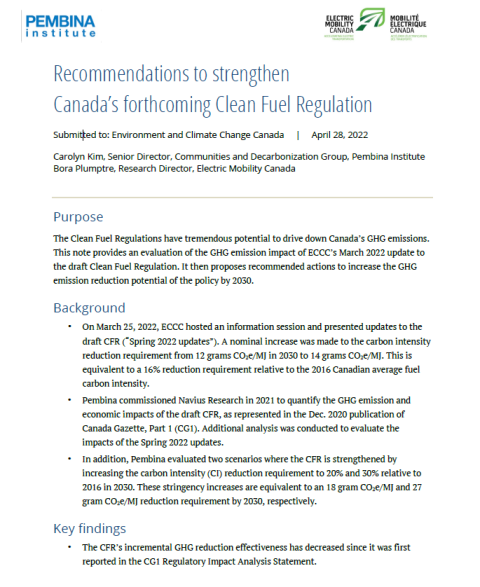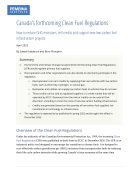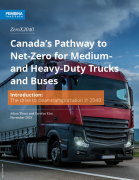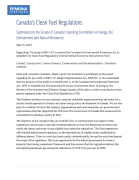Carolyn Kim, Senior Director, Communities and Decarbonization Group, Pembina Institute and Bora Plumptre, Research Director, Electric Mobility Canada offer important insights to Environment and Climate Change Canada (ECCC) as they finalize the design of the Clean Fuel Regulations (CFR).
The Clean Fuel Regulations have tremendous potential to drive down Canada’s GHG emissions. This note provides an evaluation of the GHG emission impact of ECCC’s March 2022 update to the draft Clean Fuel Regulation. It then proposes recommended actions to increase the GHG emission reduction potential of the policy by 2030.
The technical report linked to on this page was produced by Navius Research Inc.
Key findings
- The CFR’s incremental GHG reduction effectiveness has decreased since it was first reported in the CG1 Regulatory Impact Analysis Statement.
- Indeed, accounting for the Spring 2022 updates, the CFR is expected to yield an incremental reduction in GHG emission of only 3 to 6 million tonnes (Mt) by 2030, depending on the additionality of CFR credits generated through actions such as refinery process improvements and methane conservation.
- This falls short of the expected effectiveness of the policy, particularly as compared with early aspirations, and remains comparatively lower than the typical impact of a low carbon fuel standard in B.C. and other jurisdictions.
- CFR’s credit generation is expected to be largely non-incremental due to overlapping provincial and federal policies such as the carbon tax, B.C. and Quebec zero-emission vehicle(ZEV) mandates, and Ontario’s renewable fuel regulations.
- Other developments and recent policy commitments suggest that incremental emissions reductions, as estimated in the present analysis, may be even further overstated.
Conclusion
The Pembina Institute has released a fact sheet for fleets and utilities on the CFR as well as an explainer on the issue.
Carolyn Kim, co-writing with fellow CFS advocates, released a National Observer Op-ed calling for a stronger Clean Fuel Regulations.
The CFR must be further strengthened to achieve its policy objectives:
- By increasing the CFR’s GHG intensity reduction requirement from 16% to 20% in 2030, Canada could potentially achieve an additional 6 Mt reductions by 2030, for a total of up to 12 Mt incremental reductions by 2030.
- A more stringent policy of 30% could deliver a total of up to 23 Mt reductions by 2030, about 3.8 times more than what could be achieved under the current proposal.
Read the full ECCC submission to learn more.






